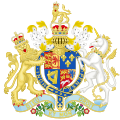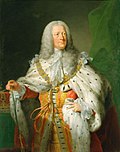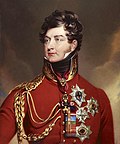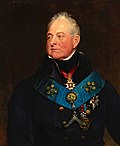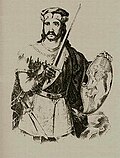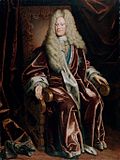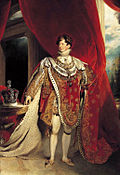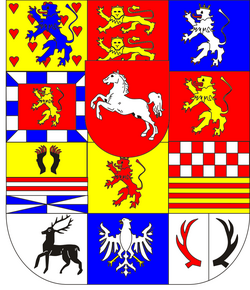| | | | | | | | | | | | | | | | | | | | George
(1582–1641)
Duke of Brunswick-Calenberg, Prince of Calenberg | | Anna Eleonore of Hesse-Darmstadt
(1601–1659) |
| |
| | | | | | | | | | | | | | | | | | | | | | | | | | |
| | | | | | | | | | | | | | | | | | | | | | | | | | | |
Christian Louis
(1622–1665)
Duke of Brunswick-Lüneburg, Prince of Calenberg, Prince of Lüneburg | | George William
(1624–1705)
Duke of Brunswick-Lüneburg, Prince of Calenberg, Prince of Lüneburg | | John Frederick
(1625–1679)
Duke of Brunswick-Calenberg, Prince of Calenberg | | Sophie Amalie of Brunswick-Calenberg
(1628–1685) | | Frederick III
(1609–1670)
King of Denmark | | Ernest Augustus
(1629–1698)
Duke of Brunswick-Lüneburg, Elector-designate of Hanover, Prince of Calenberg, Prince-bishop of Osnabrück | | Sophia of Hanover
(1630–1714) |
| | |
| | | | | | | | | | | | | | | | | | | | | | | | | | | | | | | | | | | | | | | | | | | | | | | |
| | | | | | | | | | | | | | | | | | | | | | | | | | | | | | | | | | | | | | |
| | | | | | | | | | | | | | | | Sophia Dorothea of Celle
(1666–1726) | | George I
(1660–1727)
King of Great Britain, Duke of Brunswick-Lüneburg, Prince of Calenberg, Prince of Lüneburg, Elector of Hanover | | Maximilian William of Brunswick-Lüneburg
(1666–1726) | | Sophia Charlotte
(1668–1705)
Queen in Prussia | | Charles Philip of Brunswick-Lüneburg
(1669–1690) | | Christian Henry of Brunswick-Lüneburg
(1671–1703) | | Ernest Augustus
(1674–1728)
Duke of York and Albany, Prince-bishop of Osnabrück
|
| |
| | | | | | | | | | | | | | | | | | | | | | | | | | | | |
| | | | | | | |
| | | | | | | | | | | | | | | | Caroline of Ansbach
(1683–1737) | | George II
(1683–1760)
King of Great Britain, Elector of Hanover | | Sophia Dorothea of Hanover
(1687–1757) | | Frederick William I
(1688–1740)
King of Prussia |
| | |
| | | | | | | | | | | | | | | | | | | | | | | | | | | | | | | | | | | | | | | | | | | | | | | | | |
| | | | | | | | | | | | | | | | | | | | | | | | | | | | | | | | | | | | | | | | | | | |
| | | | Augusta of Saxe-Gotha
(1719–1772) | | Frederick
(1707–1751)
Prince of Wales | | William IV
(1711–1751)
Prince of Orange | | Anne
(1709–1759)
Princess Royal | | Amelia Sophia Eleanor
(1711–1786) | | Caroline Elizabeth
(1713–1757) | | George William
(1717–1718) | | William Augustus
(1721–1765)
Duke of Cumberland | | Mary
(1723–1772) | | Frederick II
(1720–1785)
Landgrave of Hesse-Kassel | | Louise
(1724–1751) | | Frederick V
(1723–1766)
King of Denmark |
| | | | | |
| | | | | | | | | | | | | | | | | | | | | | | | | | | | | | | | | | | | | | | | | | | | | | | | | | | | | | | |
| | | | | | | | | | | | | | | | | | | | | | | | | | | | | | | | | | | | | | | | | | | | | | | | | | | | | | | |
Augusta Frederica
(1737–1813) | | Charles William Ferdinand
(1735–1806)
Duke of Brunswick | | George III
(1738–1820)
King of Great Britain, Duke of Brunswick-Lüneburg, Elector, then King, of Hanover | | Charlotte of Mecklenburg-Strelitz
(1744–1818) | | Frederick William II
(1744–1797)
King of Prussia | | Edward
(1739–1767)
Duke of York and Albany | | Elizabeth Caroline
(1741–1759) | | William Henry
(1743–1805)
Duke of Gloucester and Edinburgh | | Henry
(1745–1790)
Duke of Cumberland and Strathearn | | Louisa
(1749–1768) | | Frederick
(1750–1765) | | Caroline Matilda
(1751–1775) | | Christian VII
(1749–1808)
King of Denmark |
| | | | |
| | | | | | | | | | | | | | | | | | | | | | | | | | | | | | | | | | | | | | |
| | | | | |
| | | | | | | | | | | | | | | | | | | | | | | | | | | | | | | | | | | | | | | | | | | | | | | | | | | | |
| | | | | | | | | | | | | | | | | | | | | | | | | | | | | | | | | | | | | | | | | | | | | | | | | | | | | |
| | | | | Caroline of Brunswick
(1768–1821) | | George IV
(1762–1830)
King of Great Britain, Duke of Brunswick-Lüneburg, Elector of Hanover
(regent 1811–1820) | | Frederick
(1763–1827)
Duke of York and Albany, Prince-bishop of Osnabrück
| | Frederica Charlotte
(1767–1820)
Princess of Prussia | | Adelaide of Saxe-Meiningen
(1792–1849) | | William IV
(1765–1837)
King of Great Britain, Elector of Hanover | | Charlotte
(1766–1828)
Princess Royal | | | Frederick I
(1754–1816)
King of Württemberg | | Edward
(1767–1820)
Duke of Kent and Strathearn | | Victoria
(1786–1861)
Princess of Saxe-Coburg-Saalfeld | | Augusta Sophia
(1768–1840) |
| | | | | | | | |
| | | | | | | | | | | | | | | | | | | | | | | | | | | | | | | | | | | | | | | | | | | | | | | |
| | | | | | | | |
| | | | | | | | | | | | | | | | | | | | | | | | | | | | | | | | | | | | | | | | | | | | | | | | | | | | | | | | |
| | | | | | | | | | | | | | | | | | | | | | | | | | | | | | | | | | | | | | | | | | | | | | | | | | | | | | | | | | | |
Elizabeth
(1770–1840) | | Frederick VI
(1769–1829)
Landgrave of Hesse-Homburg | | | Ernest Augustus
(1771–1851)
Duke of Brunswick-Lüneburg, King of Hanover | | Frederica of Mecklenburg-Strelitz
(1778–1841) | | Augustus Frederick
(1773–1843)
Duke of Sussex | | | Adolphus
(1774–1850)
Duke of Cambridge | | Augusta
(1797–1889)
Princess of Hesse-Kassel | | Mary
(1776–1857) | | William Frederick
(1776–1834)
Duke of Gloucester and Edinburgh | | Sophia Matilda
(1777–1848) | | | Octavius
(1779–1783) | | Alfred
(1780–1783) | | Amelia
(1783–1810) |
| | | | | |
| | | | | | | | | | | | | | | | | | | | | | | | | | | | | | | | | | | | | | | | | | | | | | | | | | | | | | | | | |
| | | | | | | | | | | | | | | | | | | | | | | | | | | | | | | | | | | | | |
Leopold I
(1790–1865)
King of the Belgians | | Charlotte
(1796–1817)
Princess of Wales | | George V
(1819–1878)
Duke of Brunswick-Lüneburg, King of Hanover | | Marie of Saxe-Altenburg
(1818–1907) | | Charlotte
1819
Princess of Clarence | | Elizabeth
(1820–1821)
Princess of Clarence | | George
(1819–1904)
Duke of Cambridge | | Augusta
(1822–1916)
Princess of Cambridge | | Frederick William
(1819–1904)
Grand Duke of Mecklenburg-Strelitz | | Mary Adelaide
(1833–1897)
Princess of Cambridge | | Francis
(1837–1900)
Duke of Teck | | Victoria
(1819–1901)
Queen of Great Britain | | Albert
(1819–1861)
Prince of Saxe-Coburg and Gotha |
| | | | | |
| | | | | | | | | | | | | | | | | | | | | | | | | |
| | | | | | | | | | | | | | |
| | | | Thyra
(1853–1933)
Princess of Denmark | | Ernest Augustus
(1845–1923)
Duke of Brunswick-Lüneburg, Crown Prince of Hanover, Duke of Cumberland and Teviotdale | | Frederica
(1848–1926)
Princess of Hanover | | Alphons von Pawel-Rammingen
(1843–1932) | | Marie
(1849–1904)
Princess of Hanover | | | | | | | | | | Wilhelm II
(1859–1941)
Emperor of Germany |
| | |
| | | | | | | | | | | | | | | | | | | | | | | | | | | | | | | | | | | | | | |
| | | | | | | | | | | | | | | | | | | | | | | | | | | | | |
Maximilian
(1867–1929)
Prince of Baden | | Marie Louise
(1879–1948)
Princess of Hanover | | George William Christian Albert Edward Alexander Friedrich Waldemar Ernst Adolf
(1880–1912)
Hereditary Prince of Hanover | | Alexandra
(1882–1963)
Princess of Hanover | | Frederick Francis IV
(1882–1945)
Grand Duke of Mecklenburg-Schwerin | | Olga
(1884–1958)
Princess of Hanover | | Christian Friedrich Wilhelm Georg Peter Waldemar
(1885–1901)
Prince of Hanover | | Ernest Augustus
(1887–1953)
Duke of Brunswick | | Victoria Louise
(1892–1980)
Princess of Prussia |
| | | |
| | | | | | | | | | | | | | | | | | | | | | | | | | | | | | | | | | | | | | | | | |
| | | | | | | | | | | | | | | | | | | | | | | | | | | | | | | | | | | | |
Ortrud
(1925–1980)
Princess of Schleswig-Holstein-Sonderburg-Glücksburg | | Ernest Augustus
(1914–1987)
Prince of Hanover | | Countess Monika zu Solms-Laubach
(1929–2015) | | George William
(1915–2006)
Prince of Hanover | | Sophie
(1914–2001)
Princess of Greece and Denmark | | Frederica
(1917–1981)
Princess of Hanover | | Paul
(1901–1964)
King of Greece | | Christian Oscar Ernst August Wilhelm Viktor Georg Heinrich
(1919–1981)
Prince of Hanover | | Mireille Dutry
(b. 1946) | | Welf Heinrich Ernst August Georg Christian Berthold Friedrich Wilhelm Louis Ferdinand
(1923–1997)
Prince of Hanover | | Alexandra
(1937–2015)
Princess of Ysenburg and Büdingen |
| | | | | | |
| | | | | | | | | | | | | | | | | | | | | | | | | | | | | | | | | | | | | | | | | | | | |
| | | | | | | | | | | | | | | | | | | | | | | | | | | | | | | | | | | | | | | | | | | |
| Count Michael von Hochberg | | Marie
(b. 1952)
Princess of Hanover | | Chantal Hochuli | | Ernst August
(b. 1954)
Prince of Hanover | | Caroline
(b. 1957)
Princess of Monaco | | Ludwig Rudolph
(1955–1988)
Prince of Hanover | | Isabella von Thurn und Valsássina-Como-Vercelli
(1962–1988) | | Olga Sophie Charlotte Anna
(b. 1958)
Princess of Hanover | | Alexandra
(b. 1959)
Princess of Hanover | | Andreas
8th Prince of Leiningen | | Heinrich
(b. 1961)
Prince of Hanover | | Thyra von Westernhagen |
| | | | | | | |
| | | | | | | | | | | | | | | | | | | | | | |
| | | | | | | | | | | |
Ekaterina Igorievna Malysheva
(b. 1986) | | Ernst August
(b. 1983)
Prince of Hanover | | Christian
(b. 1985)
Prince of Hanover | | | | | | Alexandra
(b. 1999)
Princess of Hanover |
| |














